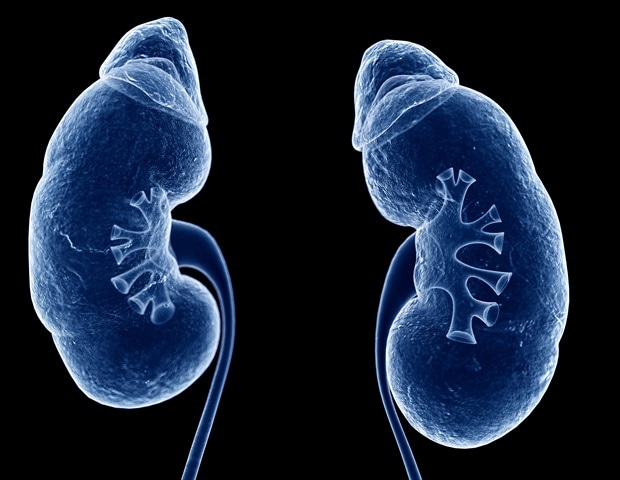A study from researchers at National Institutes of Health (NIH) and their collaborators revealed a significant genetic risk factor for kidney disease in people from Ghana and Nigeria. Their study demonstrated that having just one risk variant in a gene known as APOL1 can significantly increase the risk of developing kidney disease. APOL1 is important for the immune system and variants of the gene are linked to increased risk of chronic kidney disease. The study is published in the New England Journal of Medicine and was conducted by researchers from the Human Heredity and Health in Africa (H3Africa) Kidney Disease Research Network.
Previous research established that genomic variants in APOL1 increase the risk of developing chronic kidney disease among African Americans. However, not much is known about how these genomic variants affect people from West African countries, where many African Americans derive genetic ancestry. Studying how these genomic variants contribute to chronic kidney disease in West Africans and people with West African ancestry can also help inform the risk of kidney disease in many Americans.
“Our study provides data about West Africans that will help us better understand the risk of chronic kidney disease associated with APOL1 variants,” said Adebowale A. Adeyemo, M.B.B.S., who is a co-author of the study and is the deputy director and chief scientific officer of the Center for Research on Genomics and Global Health at NIH’s National Human Genome Research Institute (NHGRI). “By comparing this study to previous studies involving the African American population, we can gain a deeper understanding of the effects of these high risk APOL1 variants. Knowing your genetic risk for a disease, such as kidney disease, can help you make more informed decisions about your health and potentially lead to earlier interventions.”
Over 8,000 people from Ghana and Nigeria participated in the study, including nearly 5,000 people with chronic kidney disease of various stages and more than 800 people who had kidney biopsies that confirmed their disease.
The study found that nearly one-third of individuals in these two nations carry APOL1 variants that increase the risk of chronic kidney disease. While these APOL1 variants are seen most often in people of West African descent, other studies have found these variants in people from Europe, Asia, Central and South America.
The researchers also found that having a risk variant in one copy of the APOL1 gene increases the risk of developing chronic kidney disease, contrary to previous studies in the African American population suggesting that both copies of APOL1 needed to contain such variants to increase the overall risk. One risk variant increases the risk of chronic kidney disease by 18%, while two risk variants, one on each copy of APOL1, increases the risk by 25%.
These APOL1 risk variants also drastically increase the likelihood of developing a rare kidney condition called focal segmental glomerulosclerosis, which is scarring of the kidney tissues.
Findings in a particular study or with a specific ancestral group are often taken to be true for all humankind, but there is often substantial diversity even within specific ancestry or ethnic groups. This study highlights the importance of studying diverse populations around the globe when studying the genomics of human disease so that genomic medicine can equitably benefit people worldwide.”
Dr. Adebowale A. Adeyemo, M.B.B.S., co-author of the study
More than 1 in 7 U.S. adults have chronic kidney disease -; an estimated 37 million Americans, and African American, Hispanic American and Native American populations are more likely to develop the disease. Both genetic and environmental factors, which includes social factors, such as smoking, lack of exercise, an unhealthy diet and lack of access to healthcare, contribute to the risk of kidney disease. People with kidney disease may not have noticeable symptoms in the early stages of the disease. Additionally, for people with diabetes or hypertension, there is a greater risk for developing kidney disease. As the kidneys are slowly damaged over time, they are unable to filter blood properly, leading to a buildup of waste in the body.
As the disease progresses, additional kidney functions are affected, such as the stimulation of red blood cell production and the maintenance of the body’s calcium balance. The disease can lead to other health issues such as stroke and heart attacks.
“Further research conducted with participants in the United States can help us understand how APOL1 variants affect the kidney,” says Paul Kimmel, M.D., program director at the National Institute of Diabetes and Digestive and Kidney Diseases (NIDDK) and co-author of the study. “Overall, we hope that these findings can provide insight into improving the health of patients at risk for and with kidney disease.”
Source:
NIH/National Human Genome Research Institute
Journal reference:
Gbadegesin, R. A., et al. (2024). APOL1 Bi- and Monoallelic Variants and Chronic Kidney Disease in West Africans. New England Journal of Medicine. doi.org/10.1056/nejmoa2404211.
Read the full article here


